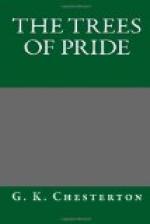Ashe picked it up and stood with it in his hand, frowning.
“We want Doctor Brown here,” he said. “This may be the bone of some animal. Any dog or sheep might fall into a hidden well.” Then he broke off, for his companion was already detaching a second bone from the net.
After another half hour’s effort Paynter had occasion to remark, “It must have been rather a large dog.” There were already a heap of such white fragments at his feet.
“I have seen nothing yet,” said Ashe, speaking more plainly. “That is certainly a human bone.” “I fancy this must be a human bone,” said the American.
And he turned away a little as he handed the other a skull.
There was no doubt of what sort of skull; there was the one unique curve that holds the mystery of reason, and underneath it the two black holes that had held human eyes. But just above that on the left was another and smaller black hole, which was not an eye.
Then the lawyer said, with something like an effort: “We may admit it is a man without admitting it is—any particular man. There may be something, after all, in that yarn about the drunkard; he may have tumbled into the well. Under certain conditions, after certain natural processes, I fancy, the bones might be stripped in this way, even without the skill of any assassin. We want the doctor again.”
Then he added suddenly, and the very sound of his voice suggested that he hardly believed his own words.
“Haven’t you got poor Vane’s hat there?”
He took it from the silent American’s hand, and with a sort of hurry fitted it on the bony head.
“Don’t!” said the other involuntarily.
The lawyer had put his finger, as the doctor had done, through the hole in the hat, and it lay exactly over the hole in the skull.
“I have the better right to shrink,” he said steadily, but in a vibrant voice. “I think I am the older friend.”
Paynter nodded without speech, accepting the final identification. The last doubt, or hope, had departed, and he turned to the dragging apparatus, and did not speak till he had made his last find.
The singing of the birds seemed to grow louder about them, and the dance of the green summer leaves was repeated beyond in the dance of the green summer sea. Only the great roots of the mysterious trees could be seen, the rest being far aloft, and all round it was a wood of little, lively and happy things. They might have been two innocent naturalists, or even two children fishing for eels or tittlebats on that summer holiday when Paynter pulled up something that weighed in the net more heavily than any bone. It nearly broke the meshes, and fell against a mossy stone with a clang.




